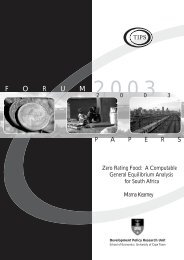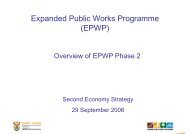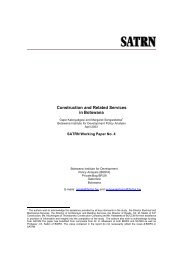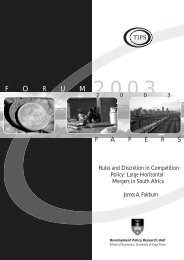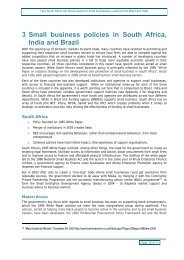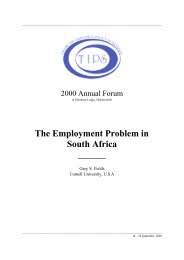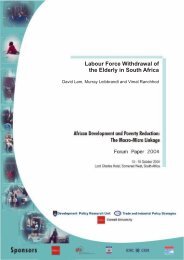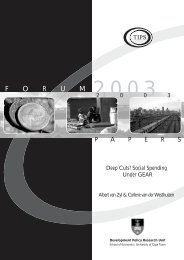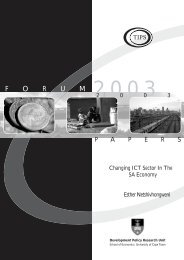(AsgiSA) Annual Report 2008 - South African Government Information
(AsgiSA) Annual Report 2008 - South African Government Information
(AsgiSA) Annual Report 2008 - South African Government Information
Create successful ePaper yourself
Turn your PDF publications into a flip-book with our unique Google optimized e-Paper software.
Accelerated and Shared Growth Initiative for <strong>South</strong> Africa<br />
ANNUAL REPORT<br />
<strong>2008</strong><br />
To oversee the transition, The Presidency has set up an alignment committee comprising representatives<br />
from the DoE and the Jipsa Secretariat. The current institutional arrangement for Jipsa remains in<br />
place with the Secretariat located at the National Business Initiative (NBI) and reporting to The Presidency.<br />
The funding received from the Business Trust and the Employment Promotion Programme will enable<br />
the Secretariat to continue to drive forward the work that has been initiated in each of the identified<br />
priority areas. It will also support the DoE in taking forward the HRDS-SA with the full support and commitment<br />
of all role-players. This will be done through engagement and consultation and will ensure<br />
that cognisance is taken of issues and concerns raised by role-players.<br />
4.13 Concluding assessment<br />
It is clear from the above report that <strong>South</strong> Africa is beginning to see a positive systemic response to<br />
the development and acquisition of skills. The number of learners registering for artisan development<br />
and engineering programmes is increasing. It is evident, however, that <strong>South</strong> Africa cannot afford to<br />
be complacent and must continue to drive forward the skills agenda, invest in our human capital and<br />
ensure that all social partners remain committed to playing a leading role in the development and<br />
acquisition of skills.<br />
The recent downturn in the world economy has resulted in massive job losses with most companies<br />
being forced to cut costs. Unfortunately, in many cases, training budgets may be the first to be slashed<br />
in times of economic recession, as companies seek to guard against job losses. While <strong>South</strong> Africa has<br />
not been affected as adversely as other global economies, a cautionary mood prevails in the country<br />
and we can expect to see a decline in training and development in the immediate future. It is, however,<br />
important to make the argument that if we do not continue to invest in our human capital, when<br />
the economy recovers, companies will once again be unable to recruit suitably skilled people. Jipsa<br />
therefore has an important role to play in the development and acquisition of skills in the immediate<br />
term and in ensuring that all social partners remain committed to driving forward the skills agenda and<br />
investing in our human capital.<br />
Jipsa’s success can be attributed to a number of factors: the central importance of leadership from the<br />
Deputy President and ownership of the skills challenge by the different role-players. It is evident that<br />
for Jipsa to meet its objectives, leadership and ownership by all sectors would need to be strengthened.<br />
Jipsa will continue to engage project owners with a view to strengthening the relationships and<br />
partnerships that have been formed since Jipsa’s inception and ensuring that project owners have the<br />
necessary support and capacity to jointly find solutions to the skills challenge.<br />
1<br />
SARB (<strong>2008</strong>)<br />
39



